Despite the worsening climate crisis, Big Gas is trying to massively build out fracked-gas pipeline infrastructure in Virginia. Dominion Energy wants to build the largest gas peaker plant in the Commonwealth. The Mountain Valley Pipeline has just been approved to begin transporting fracked gas through the Blue Ridge and Appalachian regions of Virginia and West Virginia. Yet another fracked gas pipeline is proposed to expand an already huge Transco pipeline system. At the same time, a boom in data centers is causing utilities to falsely claim that they won’t be able to meet their clean energy targets set out by law.
These projects are being built with a lifetime of 40 years and will lock us into dirty energy for decades. This is NOT the future we need and it flies in the face of the Commonwealth’s historic clean energy standards. From fueling toxic fracking, to destroying our shared waterways, to polluting majority Black neighborhoods, to leaking heat-trapping methane, these projects would harm our communities and our climate every step of the way.
CCAN is devoted to stopping these and other fossil fuel projects in Virginia. We’re working with frontline communities to participate in the regulatory process and protest these pipeline projects, while focusing on the long-term goal of ending all new fossil fuel projects in the Commonwealth. Take action now to tell Virginia legislators: No new fossil fuels in Virginia!
Dominion Energy’s Chesterfield Methane Gas Plant
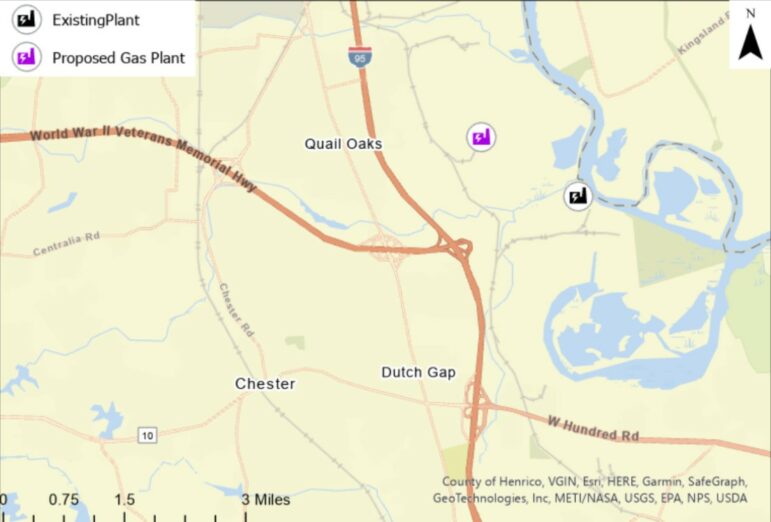
Utility monopoly Dominion Energy is proposing a massive new methane gas plant near the James River, consisting of four new generators totalling 1000 MW of installed capacity. This would be the largest peaker plant in Virginia, releasing as much greenhouse gas emissions as putting 120,000 new cars on the road every year.
Although Dominion is calling this a “peaker” plant, it would run 3240 hours per year – 37% of the time. “Peaker plant” usually only operates a couple hundred hours per year. Dominion is intentionally misleading the public.
Learn more about this campaign then sign the petition: No Chesterfield Power Plant!
Data Centers
Right now, some of the wealthiest companies in the world are getting tax subsidies from our pockets to build giant data centers in Northern Virginia.
Data centers use loads of electricity and heat. To write a single 100-word email, an AI chatbot requires more than one bottle of water to cool its servers, and the same amount of power as it takes to power 14 LED light bulbs for one hour. Dominion Energy is choosing to use obsolete fossil fuels to provide that power instead of investing in cleaner, more affordable energy. This means importing coal from Pennsylvania power plants and building the Chesterfield gas plant – the first of many gas plants Dominion wants to build to support the data industry. Virginia families will foot the bill for these projects, and all people will face the health consequences from the resulting pollution.
Last year at the General Assembly CCAN Action Fund supported a bill requiring data centers to run on clean energy and meet energy efficiency standards. Not only did it not pass, it did not even get a real hearing. But right now, a Virginia committee is studying the effect that data centers are having on our ability to transition to a clean, carbon free future, as well as their impact on ratepayers, land use, and water quality.
And, because our state decisionmakers refused to put up any guardrails, there are ZERO requirements for these mega-electricity users to run efficiently on clean energy. Some of them are even planning to use on-site diesel generation. That needs to change! We need to hold the data center industry accountable by ensuring their electricity needs are met efficiently with clean energy and without pushing infrastructure costs off to ratepayers.
Southeast Supply Enhancement Project
The Southeast Supply Enhancement Project (SSEP) is a multi-state monster-sized pipeline. Their plan is to expand the already HUGE Transco pipeline system, building 26 miles of 42” fracked gas pipeline in Pittsylvania County, Virginia and expand or build new pipeline in North Carolina, South Carolina, Georgia, and Alabama. This will result in the same amount of greenhouse gas emissions that would’ve been released by the CANCELED Atlantic Coast Pipeline: 60 million metric tons per year! On top of this, their proposed Davidson County, North Carolina compressor station will be placed in a community in the 70th percentile state-wide for low-income residents and 80th percentile for PM2.5 occurrence (a potent pollutant that is small enough to enter the bloodstream and cause cancer).
Sign the petition to STOP the SSEP! Then, submit a comment to the Federal Energy Regulatory Commission!
Moratorium now!
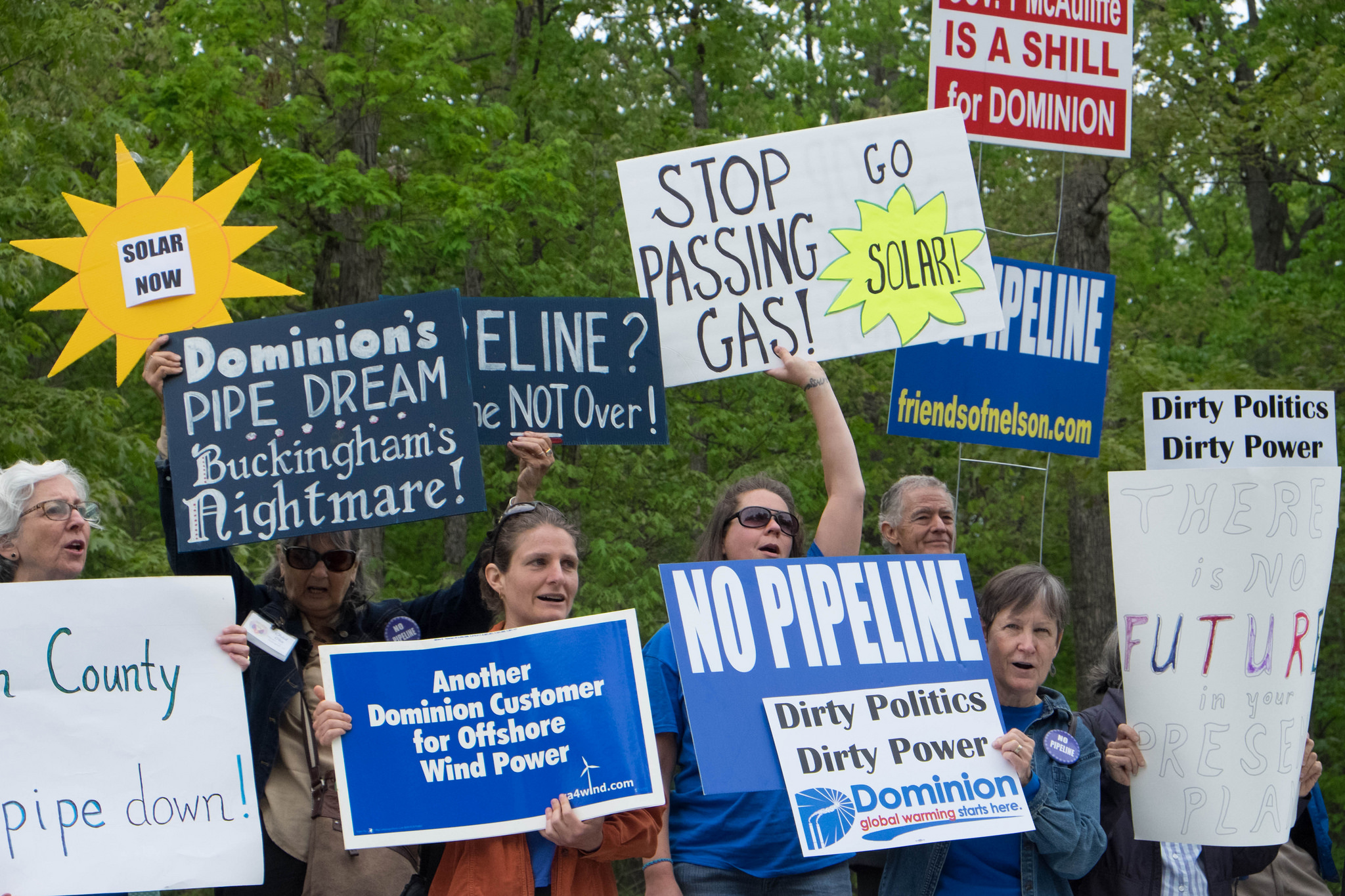 Contrary to industry claims, Virginia doesn’t need new fossil fuel projects. In fact, much of the gas is likely to flow through Virginia rather than power the state. Virginia can build a better economy by investing in solar and wind power and creating more clean energy, permanent jobs and a stable climate without jeopardizing our homes, health and heritage for new pipelines.
Contrary to industry claims, Virginia doesn’t need new fossil fuel projects. In fact, much of the gas is likely to flow through Virginia rather than power the state. Virginia can build a better economy by investing in solar and wind power and creating more clean energy, permanent jobs and a stable climate without jeopardizing our homes, health and heritage for new pipelines.
The Stakes for Our Communities and Our Climate Are High
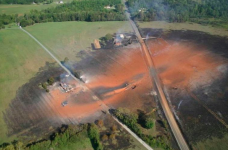 Climate: Building new gas infrastructure would incentivize more fracking across Virginia and surrounding areas, and more fracking means more emissions of methane, a powerful heat-trapping gas. The pipelines would also trigger direct emissions of carbon dioxide from compressor station engines and diesel fuel equipment, and leak methane emissions. According to growing scientific data, fracked gas could disrupt the climate on par with coal, when factoring in the full cycle of emissions from extraction to piping to and burning. With rising seas already flooding Virginia’s coastal communities, this is a risk we can’t afford to take.
Climate: Building new gas infrastructure would incentivize more fracking across Virginia and surrounding areas, and more fracking means more emissions of methane, a powerful heat-trapping gas. The pipelines would also trigger direct emissions of carbon dioxide from compressor station engines and diesel fuel equipment, and leak methane emissions. According to growing scientific data, fracked gas could disrupt the climate on par with coal, when factoring in the full cycle of emissions from extraction to piping to and burning. With rising seas already flooding Virginia’s coastal communities, this is a risk we can’t afford to take.
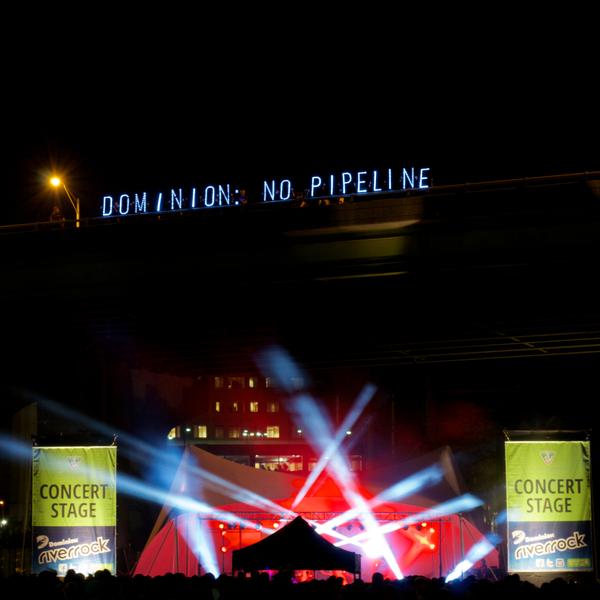 Public Safety: A pipeline “blowout” near Appomattox, Virginia in 2008 created a fireball reported to be ¼ mile high, injured five residents (including three who suffered second and third degree burns), destroyed two houses and damaged 95 more.5 Other hazards include potentially damaged drinking water from construction and leakage in fragile karst zones, and air pollution from compressor stations.
Public Safety: A pipeline “blowout” near Appomattox, Virginia in 2008 created a fireball reported to be ¼ mile high, injured five residents (including three who suffered second and third degree burns), destroyed two houses and damaged 95 more.5 Other hazards include potentially damaged drinking water from construction and leakage in fragile karst zones, and air pollution from compressor stations.
Property Values: The Forensic Appraisal Group LTD found that the negative impact of the Atlantic Coast Pipeline on property values could be “up to 30% or more” and that the presence of a 42 inch, high pressure natural gas pipeline could lead to insurance and mortgage issues.6 Similar impacts are expected for the Mountain Valley Pipeline and other fossil fuel projects.
Water Quality: Run-off and sedimentation during construction, as well as chemical additives used to keep rights of way clear can impact local surface waters, and chemicals could potentially leak into groundwater.
Iconic Ecosystems: The route for the Mountain Valley Pipeline takes it through some of the most beautiful land in Virginia, including the Blue Ridge Mountains, the Monongahela National Forest, the Appalachian Trail and the Jefferson National Forest, permanently scarring landscapes and destroying critical habitat. Dominion’s proposed Chesterfield gas plant would be situated right on the James River. And the Virginia Ripoff Project would cut through the Great Dismal Swamp and surrounding protected ecosystems.
Additional fights
TC Energy’s Virginia Ripoff Project
 From the company that brought you the Keystone XL pipeline and all of the anti protest laws with it, Trans Canada Energy has some proposed “upgrades” to an existing pipeline running from Sussex to Chesapeake. The Virginia Reliability Project, what we’re calling the “Virginia Ripoff Project,” is intended to replace almost 50 miles of pipeline from a 12 inch diameter pipeline with a 24 inch diameter pipeline – doubling capacity and our reliance on fossil fuels. We, alongside our partners in civic leagues across the region, will stand up to unneeded “upgrades” that only further entrench our energy infrastructure in polluting industries!
From the company that brought you the Keystone XL pipeline and all of the anti protest laws with it, Trans Canada Energy has some proposed “upgrades” to an existing pipeline running from Sussex to Chesapeake. The Virginia Reliability Project, what we’re calling the “Virginia Ripoff Project,” is intended to replace almost 50 miles of pipeline from a 12 inch diameter pipeline with a 24 inch diameter pipeline – doubling capacity and our reliance on fossil fuels. We, alongside our partners in civic leagues across the region, will stand up to unneeded “upgrades” that only further entrench our energy infrastructure in polluting industries!
CLICK HERE TO LEARN MORE ABOUT THE VIRGINIA RIPOFF PROJECT
The Mountain Valley Pipeline Southgate Extension
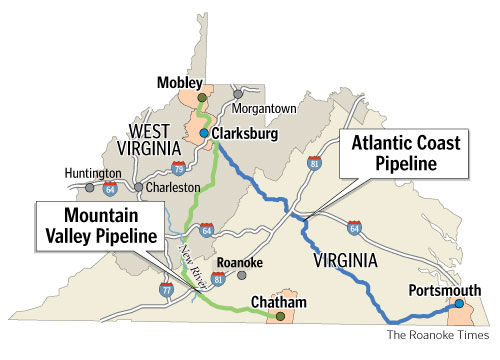
The Mountain Valley Pipeline is one of the most controversial fossil fuel projects to ever break ground in Virginia. Despite the pipeline’s terrible track record of destroying woodlands and water bodies, the companies building it want to bring their pipeline into North Carolina through the Southgate extension project. As originally designed, the project would extend the main pipeline 72 miles from Pittsylvania County, Virginia into North Carolina’s Rockingham and Alamance counties, cutting through the Blue Ridge Mountains and the Dan River. The proposal demands a 50-foot permanent easement on landowners’ property with a temporary construction easement of up to 100 feet. After community pushback, the Southgate proposal was reduced to 31 miles. Learn more with Appalachian Voices and Wild Virginia.
The Mountain Valley Pipeline Fight: Are We Winning?
A growing coalition of grassroots groups are working to oppose the Mountain Valley Pipeline, including the regional coalition Preserve Our Water, Heritage, and Rights (POWHR). CCAN has been fighting this battle on many fronts: engaging in regulatory comment periods, fighting in out in the courts, and organizing actions. We’ve supported opponents of the pipeline in organizing music festivals and rallies to bring attention to the issue and raise the funds to keep fighting this dirty and dangerous project, worked with groups to bring landowners, farmers and others living along the route of this pipeline to open houses and scoping meetings, and aided in mass direct actions to stop construction.
Currently, eight out of the ten major banks are invested in this pipeline. Con Edison Transmission, a major investor in the pipeline, has capped its backing of the project at 10% of the total cost, reason being that it does not see much of a future in natural gas ventures. We must put pressure on investors and shareholders of these companies to encourage them to pull their funding.
We’ve been fighting this for years — and will keep fighting to stop the Mountain Valley Pipeline
FERC released its flawed Environmental Impact Statement for the MVP in June of 2017, which was roundly criticized by citizens, advocacy groups, and government agencies alike. This happened after tens of thousands of U.S. citizens submitted comments demanding that FERC do a thorough, accurate and unbiased review of the proposed Mountain Valley Pipeline, and ultimately reject the project. Almost every relevant federal government agency also expressed deep concerns and criticisms of the draft review, including the Department of Interior, National Parks Service, and Virginia’s Department of Environmental Quality — and both the Bureau of Land Management and the Environmental Protection Agency questioned whether the project is even necessary. The North Carolina Department of Environmental Quality also denied a pipeline extension, called Southgate, which would have been 75 additional miles of pipeline, costing $500 million. The pipeline acquired its remaining permits for construction at the end of 2021, leaving the power in the hands of the courts.
However, this isn’t the end. We await decisions from the 4th Circuit Court of Appeals on the MVP’s noncompliance with the Endangered Species Act, the proposed Jefferson National Forest crossing and the individual Clean Water Act 401 permit for Virginia. Resistance camps remain underway. Meanwhile, the MVP continues to construct as fast as possible with more violations being documented on a near-daily basis — more than 300 egregious water quality violations have already been found.
When we fight, we win.
Until recently, Virginia was facing pipeline expansion projects from all fronts. But we’ve had major success in beating them back:
We beat the Header Injustice Project:
In 2020, Virginia Natural Gas (VNG) proposed a massive pipeline project called the “Header Improvement Project” — a horribly misleading misnomer. CCAN called it the “Header Injustice Project” because it was a travesty of environmental injustice. The proposal was for three new gas pipelines, totaling 24 miles, and three new or expanded gas compressor stations from Northern Virginia, through the middle of the state, and to the shore in Hampton Roads. Key components of the project would run through majority-minority communities. To fight this pipeline, CCAN joined with key allies to form the Stop the Abuse of Virginian Energy (SAVE) Coalition. During the height of the coronavirus crisis, we worked with the coalition to turn out hundreds of Virginians to virtual public meetings, led Twitter storms, and highlighted to the media the environmental racism that this project embodied. And our efforts worked! Read more here.
We beat the Atlantic Coast Pipeline:
On July 5, 2020, after six years of dedicated and powerful opposition, Dominion Energy and Duke Energy announced the cancellation of the Atlantic Coast Pipeline. The ACP would have carried fracked gas for 600 miles from West Virginia, across the Appalachian Trail and into Virginia and the Carolinas, costing the people $8 billion and visiting immeasurable harm on the communities in its path. The ACP was an environmental justice nightmare, siting a compressor station in the historically Black neighborhood of Union Hill in Buckingham County. As US Circuit Judge Stephanie Thacker wrote in the ruling revoking an air pollution permit for this compressor station, “environmental justice is not merely a box to be checked.” Read more here.
We beat the Chickahominy power plant and pipeline:
Balico, a merchant corporation, proposed to build an 83 mile fracked gas pipeline to fuel its own very large private power plant, the Chickahominy Powerplant. Running through 5 counties in Central Virginia, the 24in proposed pipeline would have cut through residential neighborhoods and cross both major roadways and waterways. The company shrouded itself in mystery, failing to adequately inform the public, instead sending predatory land agents, and leaving even the counties’ Boards of supervisors scratching their heads as to the progress and purpose of the pipeline. Ultimately, the pipeline was rejected by multiple agencies! Read more here.
Join the Movement: No New Fossil Fuels!
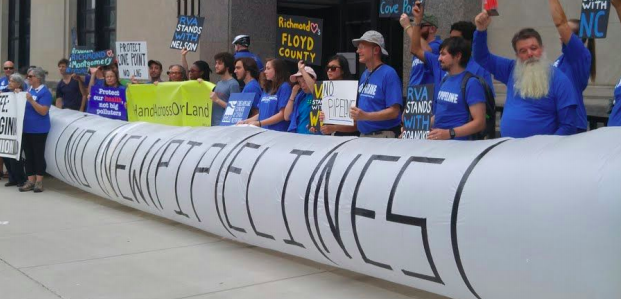 The good news is that we are NOT powerless to stop new fossil ful projects in Virginia. A groundswell of resistance to these projects is spreading across Virginia and the region.
The good news is that we are NOT powerless to stop new fossil ful projects in Virginia. A groundswell of resistance to these projects is spreading across Virginia and the region.
We won’t stand by as Big Gas destroys our neighbors’ dreams and digs us into a deeper hole on climate change.
We need our leaders to stop these dangerous new pipelines and instead stand with us to bring clean energy solutions to Virginia.
Take Action!
Become a CCAN member. Stay informed with exclusive monthly meetings on all progress and potential opportunities to get engaged on legislative and direct action efforts.
CONTACT
Want to get more involved? Contact Zander at zander@chesapeakeclimate.org.
Key Articles
- “Data Centers Demand a Massive Amount of Energy. Here’s How Some States Are Tackling the Industry’s Impact.” Propublica, 8/1/24
- “Fairfax plans to regulate data centers amid concerns about industry’s growth.” Washington Post, 7/30/24
- “Virginia fines Mountain Valley Pipeline for environmental violations after another quarterly review.” Cardinal News 7/24/24
- “Construction begins on pipeline expansion in Hampton Roads.” WHRO, 7/19/24
- “Why these Chesterfield residents are against Dominion Energy plant: ‘I don’t want to breathe in pollutants.'” WTVR, 7/24/24
- “With electricity demand predicted to double, Dominion Energy looks to add “peaker plants.”” WVTF, 7/16/24
- “Protestors March Against Fracked-Gas Pipelines,” Community Idea Stations, 5/17/19
Resources
- Click here to read a factsheet about the Mountain Valley Pipeline
- READ THE FACTSHEET ON DOMINION’S METHANE GAS PLANT PROPOSAL
- CCAN Factsheet: No New Pipelines. February 2019
- Drilling Towards Disaster: Why U.S. Oil and Gas Expansion Is Incompatible with Climate Limits. January 2019
- Art of the Self-Deal: How Regulatory Failure Lets Gas Pipeline Companies Fabricate Need and Fleece Ratepayers. September 2017
- Fact Sheet: Atlantic Coast Pipeline Would Trigger Extensive Ridgetop Removal. April 2017
- Fact Sheet: Virginia Governor Had the Opportunity to Protect Virginia Water Resources From Fracked-Gas Pipelines. October 2016
- Poll: Virginia Voters Oppose Governor McAuliffe on Fracked-Gas Pipelines. September 2016
- Infographic: Clean Energy vs. The Mountain Valley Pipeline. November 2015
- Clean Energy vs. Dominion’s Pipeline: What do we get for $5 billion?CCAN Blog and Infographic. October 2015
- We Defeated The Header Injustice Project: Virginia’s Latest Fracked Gas Threat
SOURCES
1. U.S. Energy Information Administration. “2013 Average Monthly Bill- Residential.” 2014, <http://www.eia.gov/electricity/sales_revenue_price/pdf/table5_a.pdf> Based on capital costs assumptions, and a median 20.3% capacity factor, we assume a solar output of 5,631,220 megawatt-hours. The average monthly electricity usage in Virginia is 1,156 kilowatt-hours
2. U.S. Environmental Protection Agency. “GHG Equivalencies Calculator – Calculations and References.” N.p., n.d. Web. <http://www2.epa.gov/energy/ghg-equivalencies-calculator-calculations-and-references#vehicles>
3. National Renewable Energy Laboratory. “About JEDI Photovoltaics Model.” N.p., n.d. Web. 13 Oct. 2015. <http://www.nrel.gov/analysis/jedi/about_jedi_pv.html>. Calculated using the National Renewable Energy Laboratory’s Jobs and Economic Development Indicator (JEDI) “Scenario_PV_Model_rel._PVS3.24.14”
4.The Economic Impact of the Atlantic Coast Pipeline in West Virginia, Virginia, and North Carolina. Chmura Economics and Analytics for Dominion Resources, 2014.
5. “What a Pipeline Breach Looks Like.” The Cost of the Pipeline. N.p. 18 Aug 2015. Web. 2 Oct 2015. <http://thecostofthepipeline.com/2015/08/18/what-a-pipeline-breach-looks-like/>.
6. Stanton, Elizabeth W., et al. Atlantic Coast Pipeline Benefits Review: Chmura and ICF Economic Benefits Reports. Synapse Energy Economics, Inc. for Southern Environmental Law Center, 2015.

